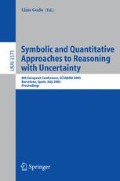Abstract
In this paper, we extend the basic abstract argumentation framework proposed by Dung, by taking into account two independent kinds of interaction between arguments: a defeat relation and a support relation. In that new framework, called a bipolar argumentation framework, we focus on the concept of acceptability and propose new semantics defined from characteristic properties that a set of arguments must satisfy in order to be an output of the argumentation process. We generalize the well-known stable and preferred semantics by enforcing the coherence requirement for an acceptable set of arguments.
Access this chapter
Tax calculation will be finalised at checkout
Purchases are for personal use only
Preview
Unable to display preview. Download preview PDF.
References
Dung, P.M.: On the acceptability of arguments and its fundamental role in nonmonotonic reasoning, logic programming and n-person games. Artificial Intelligence 77, 321–357 (1995)
Krause, P., Ambler, S., Elvang, M., Fox, J.: A logic of argumentation for reasoning under uncertainty. Computational Intelligence 11 (1), 113–131 (1995)
Amgoud, L., Maudet, N., Parsons, S.: Arguments, Dialogue and Negociation. In: Horn, W. (ed.) Proc. of the 14th ECAI (European Conference of Artifical Intelligence), Berlin, Germany, pp. 338–342 (2000)
Parsons, S., Sierra, C., Jennings, N.R.: Agents that reason and negociate by arguing. Journal of Logic and Computation 8, 261–292 (1998)
Karacapilidis, N., Papadias, D.: Computer supported argumentation and collaborative decision making: the hermes system. Information systems 26, 259–277 (2001)
Amgoud, L., Cayrol, C.: A reasoning model based on the production of acceptable arguments. Annals of Mathematics and Artificial Intelligence 34, 197–216 (2002)
Verheij, B.: On the existence and multiplicity of extension in dialectical argumentation. In: Benferhat, S., Giunchiglia, E. (eds.) Proceedings of the 9th International Workshop on Non-Monotonic Reasoning (NMR 2002), pp. 416–425 (2002)
Prakken, H., Vreeswijk, G.: Logics for defeasible argumentation. In: Gabbay, D., Guenthner, F. (eds.) Handbook of Philosophical Logic, vol. 4, pp. 218–319. Kluwer Academic, Dordrecht (2002)
Bench-Capon, T.: Persuasion in practical argument using value-based argumentation frameworks. Journal of Logic and Computation 13, 429–448 (2003)
Chesñevar, C.I., Maguitman, A.G., Loui, R.P.: Logical models of argument. ACM Computing surveys 32, 337–383 (2000)
Amgoud, L., Cayrol, C., Lagasquie-Schiex, M.C.: On the bipolarity in argumentation frameworks. In: Delgrande, J., Schaub, T. (eds.) Proc. of the 10th NMR workshop (Non Monotonic Reasoning), Uncertainty Framework subworkshop, Whistler, BC, Canada, pp. 1–9 (2004)
Boutilier, C.: Towards a logic for qualitative decision theory. In: Proc. of the 4th KR, Bonn, Germany, pp. 75–86 (1994)
Tan, S.W., Pearl, J.: Specification and evaluation of preferences under uncertainty. In: Proc. of the 4th KR, Bonn, Germany, pp. 530–539 (1994)
Lang, J., Van der Torre, L., Weydert, E.: Utilitarian desires. Journal of Autonomous Agents and Multi-Agents Systems 5(3), 329–363 (2002)
Benferhat, S., Dubois, D., Kaci, S., Prade, H.: Bipolar representation and fusion of preferences in the possibilistic logic framework. In: Proceedings of the eighth International Conference on Principle of Knowledge Representation and Reasoning (KR 2002), pp. 158–169 (2002)
Cayrol, C., Lagasquie-Schiex, M.C.: Gradual handling of contradiction in argumentation frameworks. In: Bouchon-Meunier, B., Foulloy, L. (eds.) Intelligent Systems for Information Processing: From representation to Applications, pp. 179–190. Elsevier, Amsterdam (2003)
Toulmin, S.: The Uses of Arguments. Cambridge University Press, Cambridge (1958)
Author information
Authors and Affiliations
Editor information
Editors and Affiliations
Rights and permissions
Copyright information
© 2005 Springer-Verlag Berlin Heidelberg
About this paper
Cite this paper
Cayrol, C., Lagasquie-Schiex, M.C. (2005). On the Acceptability of Arguments in Bipolar Argumentation Frameworks. In: Godo, L. (eds) Symbolic and Quantitative Approaches to Reasoning with Uncertainty. ECSQARU 2005. Lecture Notes in Computer Science(), vol 3571. Springer, Berlin, Heidelberg. https://doi.org/10.1007/11518655_33
Download citation
DOI: https://doi.org/10.1007/11518655_33
Publisher Name: Springer, Berlin, Heidelberg
Print ISBN: 978-3-540-27326-4
Online ISBN: 978-3-540-31888-0
eBook Packages: Computer ScienceComputer Science (R0)

